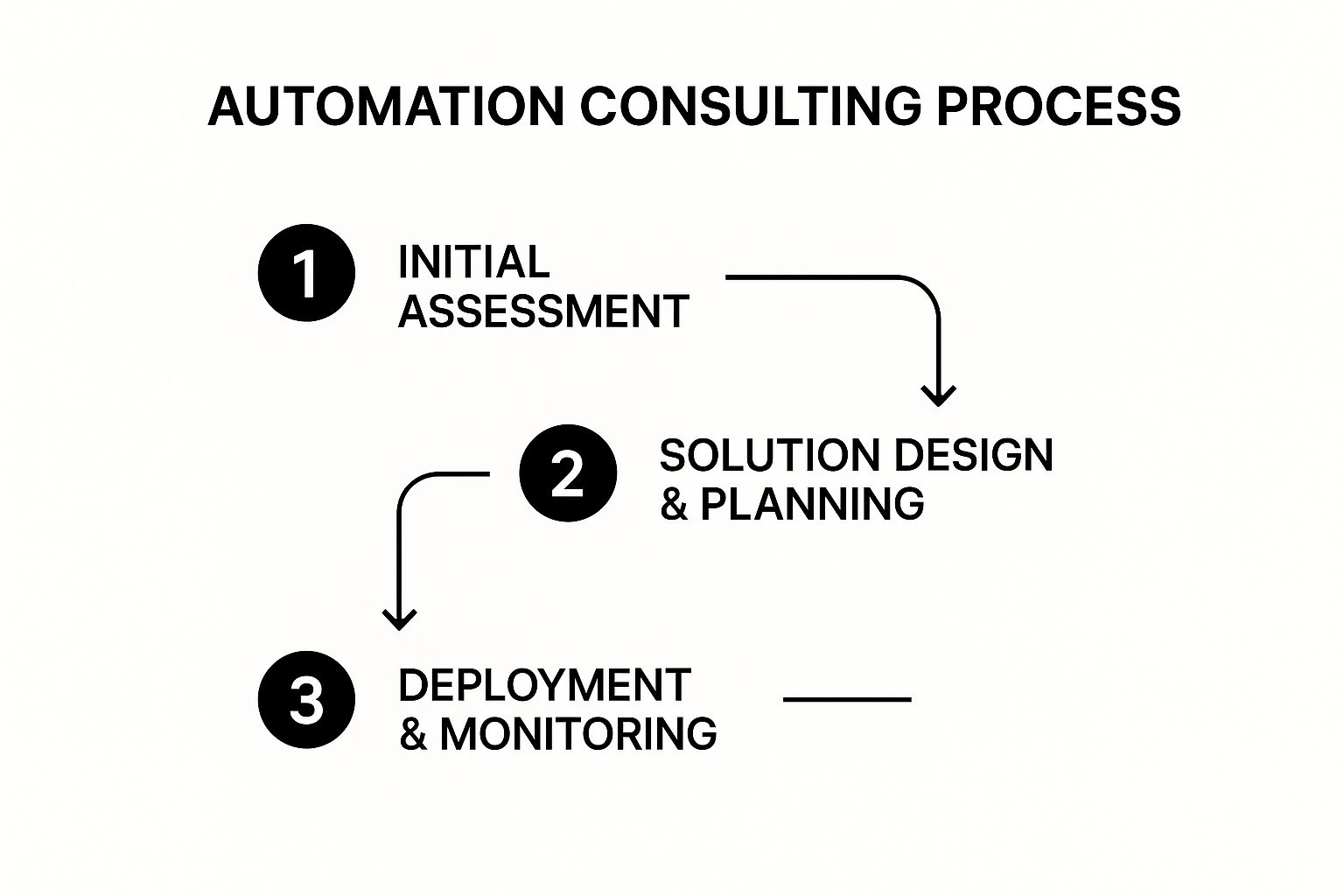Top Automation Consulting Services for Your Business Success
- Matthew Amann

- Jun 9, 2025
- 13 min read
Understanding Automation Consulting Services in Practice
Imagine a smooth-running factory where robots and people work side-by-side, or an office free from tedious paperwork, allowing employees to focus on creative problem-solving. That's the promise of automation consulting services. These services aren't just about installing software; they're about reimagining how work gets done in your organization. Think of automation consultants as expert navigators, fluent in both the language of technology and the specifics of your business.
These consultants don't just suggest generic software solutions. They dive deep into your operations. In those first few weeks, they'll carefully observe your processes, asking insightful questions that often reveal hidden inefficiencies. This initial assessment is vital because, surprisingly, the most impactful automation projects often start by removing unnecessary steps entirely, rather than simply automating existing, flawed ones.
For example, picture a company struggling with a slow invoice approval process. An automation consultant might discover that multiple approval layers are redundant, creating unnecessary bottlenecks. By simplifying the approval process before automating it, the consultant can achieve significant efficiency gains. This approach highlights a key principle of automation consulting: fix the process before you automate it. This foundational work prevents businesses from automating themselves into bigger problems down the line.
Furthermore, the demand for automation consulting services is booming worldwide, driven by the increasing need for efficient and scalable business solutions. This growth shows how valuable these services are. Discover more insights into this growing market. For a closer look at how these consultants transform teams, you might find this helpful: Business process automation consulting that transforms teams. Expert consultants help businesses avoid expensive mistakes by identifying the right processes to automate and choosing technologies that integrate smoothly with existing systems. This ensures that automation initiatives deliver real, measurable improvements. This proactive approach not only streamlines operations but also allows businesses to adapt to changing market demands and stay competitive. Choosing the right automation consulting partner is essential for maximizing the benefits of automation and achieving long-term success.
Why Smart Leaders Invest in Automation Consulting Services

Imagine you need surgery. While you could theoretically attempt it yourself, wouldn’t you prefer a skilled surgeon? Many executives feel the same about tackling automation projects alone. The real value of automation consulting services isn't just about avoiding errors; it’s about unlocking potential you didn’t even know you had.
These consultants bring clarity to complex situations. Picture a CEO wrestling with a tangled sales process. They might try to fix it internally, but an automation consultant, with experience across various industries, can offer a fresh perspective. This often leads to simpler, more effective solutions. That’s why even highly confident CEOs often bring in automation consultants early on – they understand specialized knowledge speeds up progress.
The Strategic Advantage of an Objective Expert
Automation consulting services also mitigate risk. These experts help companies navigate the often-challenging world of regulations, integration issues, and the change management process that can often derail internal automation efforts. They've encountered these challenges countless times across numerous transformations. For instance, while implementing a new CRM system might seem simple, automation consultants can identify key areas to automate customer service and other vital functions within the system, maximizing its effectiveness.
The growth of the consulting industry underscores the value of expert guidance. The global consulting services market, which includes strategy, operations, IT, and HR consulting, is projected to reach $331,606.36 million by 2025. This reflects a growing appreciation for expert advice across various business functions, including automation. Discover more insights.
Beyond the ROI Calculation
While return on investment (ROI) is always important, the strategic benefits of an objective expert often outweigh the initial cost. Consultants bring a wealth of experience from successful transformations, allowing them to foresee potential obstacles and offer proactive solutions. This foresight minimizes disruptions and makes the transition smoother.
This proactive approach not only boosts efficiency but also sets companies up for long-term success in a dynamic market. Ultimately, the value of automation consulting services extends far beyond simple cost reductions, creating a ripple effect of positive changes across the entire organization.
Inside the Process: How Automation Consulting Services Work
Imagine automation consultants in their first few weeks at your company. They’re not just there to observe; they’re acting like detectives, piecing together clues. They want to understand how work really happens – not just the official procedures, but the day-to-day realities, the hidden bottlenecks, the workarounds whispered between colleagues.
This initial assessment is like laying the foundation for a house. Automation consulting services aren't just about picking software; they're about understanding the intricate workflows that often remain unseen.
This detective work allows them to spot automation opportunities that internal teams might miss. Think of it like finding hidden efficiencies in a well-worn process.
They then focus on delivering quick, tangible results – the "low-hanging fruit." These early successes build momentum and prove the value of automation.

The infographic above shows the typical flow: Initial Assessment, Solution Design & Planning, and finally, Deployment & Monitoring. This phased approach is like building with blocks – each stage supports the next, ensuring a stable and successful outcome. Many leaders use automation to improve efficiency. Check out some practical examples in these workflow automation examples.
The Art of Asking Uncomfortable Questions
Effective automation consulting requires a delicate balance. Consultants need to ask tough questions, even if it means challenging the status quo. But they also need to build trust within the organization. This means spending more time on the front lines with employees than in executive boardrooms.
This grassroots approach ensures that the automation solutions are practical, adopted, and sustainable. It's about making sure the solutions work for the people who actually use them.
For example, imagine a consultant observing a data entry process. By simply asking "Why do you do it that way?", they might uncover an undocumented workaround for a software glitch. This seemingly small detail can have a big impact on how the process is automated.
Prioritizing Quick Wins and Long-Term Transformation
Automation consultants aren't just focused on short-term gains. While those “quick wins” are important for building confidence, they also keep the bigger picture in mind. They ensure that the initial improvements align with the overall transformation strategy.
Think of it like tending a garden. You want to see some early blooms, but you're also cultivating the soil and planning for long-term growth.
This balanced approach maximizes immediate impact while paving the way for lasting change. It's about creating a foundation for continuous improvement and preparing the organization for future success. By addressing both the present and the future, automation consulting services deliver true value and lasting transformation.
Choosing Your Automation Consulting Services Partner

Finding the right automation consulting services partner can feel overwhelming. Everyone claims to be an expert, flashing shiny case studies. But how do you separate genuine expertise from slick marketing? One crucial clue is transparency. The best consultants are open about not just their wins, but also their setbacks and what they learned from them. They recognize that true mastery comes from experience, which includes navigating tough situations.
Beyond the Case Studies: Evaluating True Expertise
It's incredibly valuable to speak with businesses that have worked with several different consulting firms. These conversations often reveal the subtle nuances that distinguish real expertise from superficial presentations. For example, a consultant who deeply understands your industry will ask insightful, specific questions about your particular obstacles, rather than offering generic, one-size-fits-all solutions. Cultural fit is also essential. A consultant's technical brilliance becomes less effective if their working style clashes with your company's culture and how you make decisions.
Engagement Models: Finding the Right Fit
Automation consulting services come in different flavors. Some firms specialize in short, intensive projects, like implementing a specific software solution such as Salesforce. Others focus on long-term strategic partnerships, providing continuous guidance and support as you advance on your automation journey. Choosing the right model depends on your particular needs and objectives. A short-term project might be ideal for a focused automation initiative, while a long-term partnership might be better for a wider digital transformation.
Asking the Right Questions: Unveiling the Consultant's Mindset
Perhaps the most telling part of selecting an automation consulting partner is the questions they ask you. Do they see your project as a chance to apply their pre-packaged methodologies and deliver predictable outputs? Or do they view it as a learning opportunity, a chance to deepen their understanding of your business? Consultants who genuinely care about your success will focus on understanding your unique challenges and crafting custom solutions.
Before making your decision, consider the following criteria to help you evaluate potential partners:
Introducing the Automation Consulting Evaluation Framework, a table designed to guide you through the critical aspects of selecting a partner. This table highlights the essential criteria for evaluating automation consulting services partners across key decision factors.
Evaluation Factor | Strong Indicators | Warning Signs | Key Questions |
|---|---|---|---|
Industry Expertise | Deep understanding of your sector, specific questions about your challenges, relevant case studies | Generic solutions, lack of industry-specific knowledge | What experience do you have in our industry? Can you provide examples of successful projects similar to ours? |
Technical Skills | Proficiency in relevant automation technologies (e.g., UiPath), proven ability to deliver results | Overreliance on one technology, inability to adapt to changing needs | What technologies are you most proficient in? How do you stay up-to-date with the latest advancements? |
Communication & Collaboration | Clear and frequent communication, proactive problem-solving, collaborative approach | Poor communication, unresponsive team, lack of transparency | How will you communicate project updates and address potential issues? How do you involve clients in the decision-making process? |
Cultural Fit | Shared values, compatible working styles, commitment to your success | Clashing personalities, differing work ethics, focus on their own agenda | Can you describe your company culture and working style? How do you ensure a good fit with your clients? |
Cost & Value | Transparent pricing structure, clear value proposition, demonstrable ROI | Vague pricing, hidden fees, unclear value | Can you provide a detailed breakdown of costs? How do you measure the success of your projects? |
This framework offers valuable insights into what to look for and what to avoid when choosing a consulting partner. Remember, a strong partner will be a true collaborator, invested in your success.
By concentrating on these crucial factors, you can confidently select an automation consulting services partner who will steer you towards real, lasting change. This discerning approach ensures you choose a partner truly invested in your outcomes, not just adding another project to their portfolio.
Real Success Stories: Where Automation Consulting Services Excel
Imagine a manufacturing plant where quality control errors have plummeted by 85%. Picture a healthcare facility where patient wait times are now measured in minutes, not hours. Or visualize a financial institution processing loans in days instead of weeks. These aren't glimpses into the future; these are real-world results achieved through effective automation consulting services. Just like skilled architects, experienced automation consultants understand which business processes thrive with automation and which still require a human touch.
From Bottlenecks to Breakthroughs: Manufacturing Transformations
Let's walk through a manufacturing example. Imagine a company struggling with persistent quality control issues, leading to expensive product recalls and strained customer relationships. An automation consultant might pinpoint the root cause as inconsistent manual inspections. By introducing automated visual inspection systems, the company dramatically reduces errors and frees up human employees for more challenging, strategic work. This not only boosts quality but also elevates employee morale.
This example highlights the importance of strategic thinking. The consultant didn’t simply apply the latest technology; they tackled the fundamental problem. They selected a solution that aligned perfectly with the company’s unique needs and goals.
Streamlining Healthcare: Enhanced Patient Experiences
Now, consider a busy hospital emergency room grappling with long patient wait times. An automation consultant might suggest implementing an automated patient check-in system. This empowers patients to register their information quickly and efficiently, lessening the administrative burden on staff and enhancing the patient experience. This illustrates how automation can improve both operational efficiency and patient satisfaction.
Accelerating Finance: Faster Loan Processing
In the financial world, lengthy loan processing times can frustrate customers and impede business growth. Automation consultants can help smooth out this process. They might, for example, implement an automated system for verifying applicant information and assessing creditworthiness. This speeds up loan approval significantly, boosting customer satisfaction and driving revenue growth.
Beyond Technology: Managing the Human Element
These stories are about more than just technology; they’re about change management. Skilled automation consultants recognize that introducing new technology demands careful planning and open communication. They collaborate with employees to ensure a seamless transition, addressing concerns and fostering acceptance of the new systems.
These services emphasize that automation isn't about robots replacing people; it's about empowering people to engage in more meaningful work. Furthermore, the automation as a service market, closely related to consulting services, is poised for remarkable growth, predicted to surge from USD 8.32 billion in 2023 to USD 67.82 billion by 2032. Discover more about these automation market trends.
Measuring Success: Immediate Impact and Sustained Growth
Some automation projects yield immediate, quantifiable results, while others take longer to blossom. Experienced consultants recognize this and set realistic expectations. They guide businesses to understand that automation is an ongoing journey, not a quick fix. You might find this helpful: maximizing your automation ROI. They focus on building a solid foundation for long-term success. This screenshot from AWS, , showcases the wide range of automation solutions available. The key lesson? Choosing the right automation tool requires expertise and a deep understanding of your business needs. Skilled automation consultants can help you navigate this complex terrain.
Avoiding Expensive Mistakes: How Consultants Save You From Pitfalls

Even the best-laid plans for automation can sometimes go awry, turning into budget-busting headaches. Think of automation consulting services as experienced Sherpas guiding you up a challenging mountain. They've seen it all, the pitfalls, the wrong turns, and they know the most efficient path to reach the summit – your automation goals. This section explores common, costly automation errors through real-world examples and how consultants help businesses avoid them.
Automating the Wrong Processes: A Costly Misdirection
One of the most frequent missteps is automating the wrong processes first. Companies sometimes focus on automating highly visible tasks without truly considering their strategic value. Imagine a business automating expense reports while a critical bottleneck in their order fulfillment process remains untouched. It might create a superficial sense of progress but fails to address the core issues hindering growth.
Experienced automation consultants help you prioritize. They work with you to identify which processes offer the greatest potential impact, ensuring your automation efforts align with your overall business goals. They're like architects, ensuring the foundation is solid before building the rest of the house.
Technology Integration Nightmares: When Shiny Tools Don't Fit
Another common pitfall is falling in love with shiny new technologies that don't integrate with existing systems. It's like buying a top-of-the-line coffee maker that doesn't fit your kitchen counter. A business might invest heavily in a cutting-edge CRM system only to find it doesn't communicate with their existing inventory management software.
This creates data silos, forcing employees to resort to manual workarounds, ultimately diminishing the anticipated return on investment. Automation consulting services prioritize integration, ensuring chosen technologies work seamlessly within your current IT ecosystem. They're like skilled plumbers, making sure everything connects and flows smoothly.
Resistance to Change: When Employees Become Roadblocks
Introducing new systems that employees resist is another recipe for failure. It's like building a state-of-the-art highway that no one wants to use. A company might implement an automated scheduling system that employees find confusing and difficult to use, leading to low adoption rates and increased frustration.
The best automation consultants understand that technology is just one piece of the puzzle. They prioritize change management, engaging with employees to address their concerns, build buy-in, and foster a culture of acceptance for the new systems. They act as bridges, connecting the technology with the people who will use it.
Real-World Recovery: Consultants Turning Around Near-Disasters
We’ve seen situations where businesses invested significant sums in automation projects that actually hindered operations. Imagine automating customer service interactions only to find the new system is less efficient than the previous manual process.
In these cases, automation consulting services step in like "ER doctors," diagnosing the root causes of the failure and implementing corrective measures. They might uncover flawed process design, inadequate training, or a mismatch between technology and user needs. They’re skilled at finding the problem and prescribing the right solution.
The Power of Change Management: Beyond Technical Prowess
These real-world examples highlight a critical point: change management expertise is often more valuable than technical knowledge in automation projects. The best consultants don't just implement technology; they generate genuine employee enthusiasm for automation, turning workforce anxieties into opportunities for improvement. They recognize that successful automation requires not only technical proficiency but also the ability to guide people through periods of transition.
To better illustrate the common pitfalls and how consultants address them, let's take a look at the following table. It summarizes the key challenges and provides insights into the strategic role consultants play in preventing these costly mistakes.
Common Pitfall | Business Impact | Prevention Strategy | Consultant Role |
|---|---|---|---|
Automating the wrong processes | Wasted resources, missed opportunities | Prioritize processes based on strategic impact | Process analysis, ROI assessment |
Technology integration issues | Data silos, increased manual work, reduced ROI | Ensure compatibility with existing systems | System integration planning, technology selection |
Employee resistance | Low adoption rates, decreased productivity, increased frustration | Change management, employee engagement, training | Stakeholder communication, training development |
Lack of clear metrics | Difficulty measuring success, inability to track progress | Define key performance indicators (KPIs) | KPI development, performance monitoring |
This table clarifies how a proactive, consultant-led approach can transform potential automation risks into drivers of growth and innovation. By understanding these common pitfalls and the value of experienced guidance, businesses can leverage automation consulting services to achieve sustainable, impactful results.
Your Next Steps: Making Automation Consulting Services Work
Ready to explore automation consulting services? Let's move from the theoretical and into the practical. Think of this section as your roadmap for working with automation consultants, setting achievable goals, and making sure your automation efforts pay off in the long run.
Preparing for Initial Consultations
Those first conversations with potential consultants are essential. It's like interviewing job candidates – you learn a lot about their approach and expertise. Before you even start, gather all the relevant information about your current processes, where you're experiencing friction, and what you ultimately want to achieve. Imagine you're giving a doctor your medical history—the more details you provide, the better they can diagnose and treat the issue. This groundwork will make your discussions much more effective.
Also, setting a clear budget and timeline upfront is key. This helps narrow down potential partners and sets realistic expectations. Complex projects require time and resources. Consider quick wins for a fast impact, but also don't lose sight of those bigger, long-term strategic goals that create lasting value.
Asking the Right Questions
Remember, you are interviewing them. The questions you ask are as important as the answers you receive. Don't be afraid to ask about past failures, not just successes. A consultant who's open about setbacks shows honesty and a commitment to continuous improvement. Think of it like checking references—you want the full story, not just the highlights.
Industry experience matters too. Just as a specialized doctor knows more about a specific area than a general practitioner, a consultant familiar with your industry’s particular nuances will be better equipped to handle your unique challenges.
Finally, delve into their change management approach. This is often even more critical than technical skills. A good consultant focuses on getting your team on board, not treating them as obstacles to overcome. For more insights on streamlining operations, check out this helpful article: Streamlining operations and boosting efficiency today.
Evaluating Proposals and Measuring Success
When you're comparing proposals, focus on understanding the big-picture strategy, not just the flashy technical details. It’s like looking at blueprints for a house. A beautiful design is worthless if the foundation is shaky. Ask clarifying questions about their proposed methods, how they plan to integrate with your existing systems, and what kind of long-term support they offer.
What does success actually look like in the first 90 days? It should involve measurable improvements in your key performance indicators (KPIs), not just vague promises of future gains. A good consultant will set achievable milestones, celebrate early successes, and keep the overall vision in mind.
Sustaining Momentum After the Engagement
The true value of automation consulting services lies in whether the improvements last after the consultants leave. To ensure long-term success, focus on building internal skills and taking ownership of the new processes. It's like learning to ride a bike; you need training wheels at first, but eventually, you ride independently.
The consultant should empower your team with the knowledge and tools to maintain and optimize the automated systems. This focus on knowledge transfer and ongoing support is what distinguishes a true partner from a quick fix. By establishing a foundation for lasting change, you maximize your automation investment for years to come.
Ready to tap into the potential of automation? Learn how Flow Genius can help you achieve your business objectives with smart automation consulting and implementation.

Comments